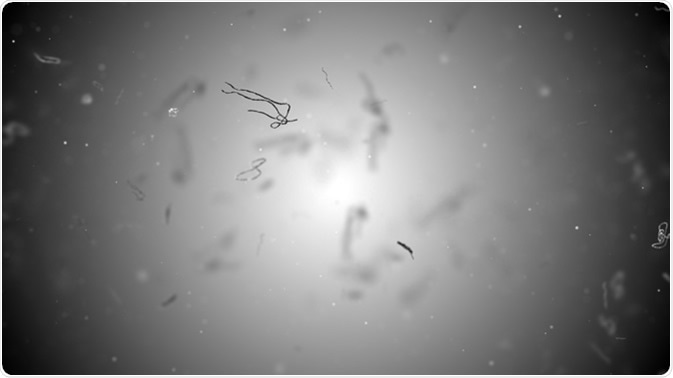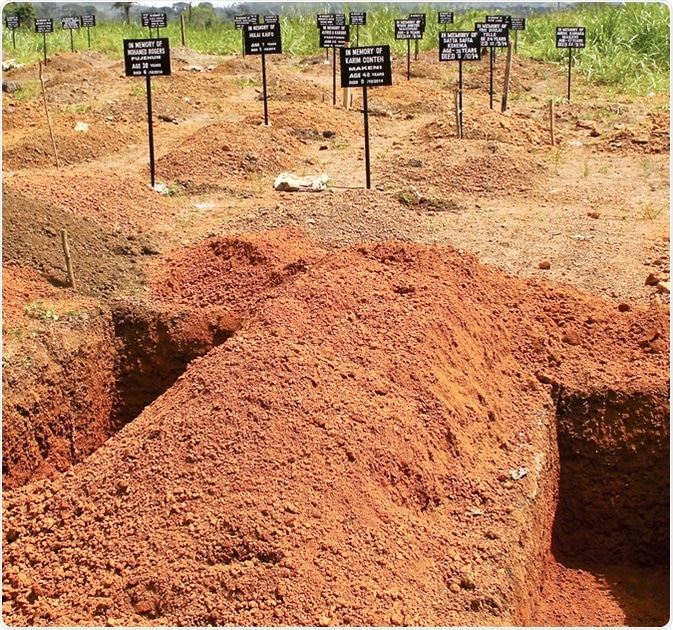Skip to:
The Ebola virus causes severe and often lethal infections. While an efficient treatment has not yet been found, it has been observed that Ebola-infection survivors develop antibodies against the virus, from which antibody-therapies could be derived.
 Neutralizing Antibodies" />
Neutralizing Antibodies" />
Ebola virus or germs microorganism cells under microscope. Illustration Credit: Alexey Godzenko / Shutterstock
Recently, an international research collaboration has shown that in a safe, non-infectious vaccination trial, effective antibodies occurred soon after vaccination, raising the expectation that future antibody therapies can be sourced in a safe manner.
This research has been published in April in the Journal Cell Reports.
Ebola is an infectious and deadly virus for humans, particularly affecting African countries where healthcare is insufficiently developed to contain outbreaks. In an extraordinarily severe outbreak in West Africa between 2014 and 2016, the WHO associated more than 10,000 deaths with the virus infection. Meanwhile, vaccines against Ebola are only at the trial stage, and effective therapies have not yet been developed. Two features of Ebola make the development of therapeutic agents difficult. Firstly, the Ebola virus mutates at a high rate. Secondly, the Ebola virus is sheathed in a membrane taken from host cells in which it replicates. In effect, most of the viral surface becomes similar in appearance to its host cells, lowering the likelihood that the human immune system can identify it as a foreign intruder.

"Safe Burial Site for Ebola Victims in Sierra Leone" by United Nations Photo is licensed under CC BY-NC-ND 2.0
However, a viral glycoprotein (vGP) extends out of this membrane sheath and is required by the Ebola virus to infect its target cells. This protein has been the focus of research on vaccine and therapy development. Antibodies binding to this protein have been isolated from survivors of Ebola infections. Understanding how these antibodies work offers a path to therapeutic antibodies against Ebola that can be administered as pharmaceuticals. However, this requires sampling of body fluids from previously infected people, carrying the risk that those body fluids are still infectious and thus pose a risk to the laboratory staff.
Another route is to present the vGP as vaccine formulation and identify antibodies that are subsequently emerging. Recently, a collaboration of researchers from the United Kingdom, Taiwan and Japan, led by Professor Alain R. Townsend from Oxford University, provided evidence that antibodies from a vaccination trial emerged soon and were as effective as antibodies from Ebola-infection survivors.
Determining Antibody Effectiveness
The researchers obtained blood samples from a vaccination trial with non-infectious adenoviruses that presented the Ebola vGP on their surface. The vaccination procedure comprised two injections (initial and booster injection), and blood samples were drawn seven and 28 days after the booster injection. From the blood samples, the scientists isolated immune cells which had produced antibodies against vGP (called plasmablasts and memory B cells).
The researchers identified the sequence of the antibodies and produced these by common biotechnological methods. They carried out several experiments to determine where the antibodies bound to the vGP. Lastly, the investigators tested the strength of binding between the antibodies and vGP and derived an antibody mixture as experimental treatment formulation that was tested with Ebola-infected guinea pigs.
Neutralization of Infection in Animal Model
The scientists isolated 82 antibodies of which 38 were effective in cell-culture assays in neutralizing the vGP-presenting, non-infectious adenovirus that had been used for the vaccination. Binding assays by surface plasmon resonance spectroscopy (SPR), a common technique to measure protein-protein interaction strengths, revealed that the antibodies sourced from the vaccination had similar binding strengths as commercial Ebola antibody therapeutics which are currently in trial. The researchers determined for several of their new antibodies where they bind the vGP, and with that information designed mixtures of antibodies attacking multiple vGP sites with the prospect of a combination therapy.
By testing these combinations in a guinea pig animal model the investigators could show that certain combinations were highly effective as therapies. In addition, they could show that in vitro some antibodies neutralized several variants of the Ebola vGP, raising hope that some of them might be broadly neutralizing against several Ebola strains. The scientists intend now to investigate in further animal studies whether the broadly neutralizing activity will also hold true against different strains of Ebola in vivo. While there is still a long way until a new antibody therapy could become a drug formulation, the study lays out a safe path to new Ebola antibody variants by sourcing the antibodies from vaccination trials, circumventing the risk of infectious samples from survivors of previous Ebola infections.
Additional Information
Associated Vaccine Trial from which Blood Samples had been Obtained
The study of Rijal P et al., 2019, obtained sera for antibody identification from a previous vaccination trial published in:
Ewer K et al., A Monovalent Chimpanzee Adenovirus Ebola Vaccine Boosted with MVA. N Engl J Med 2016, 374, 1635-1646; DOI: 10.1056/NEJMoa1411627.
These studies declare that the underlying vaccination trial was registered at ClinicalTrials.gov (reference NCT02240875) and had received ethical approval from the United Kingdom National Research Ethics Service, the Committee South Central-Oxford A (reference 14/SC/1256), Committee South Central – Oxford A (OXREC A; Ref: 14/SC/1256), the Medicines and Healthcare products Regulatory Agency (MHRA; reference 21584/0334/001-0001) and the Oxford University Clinical Trials and Research Governance team.
Where animal infection studies had been undertaken, these were carried out in a Containment Level 4 laboratory and adhered to the United Kingdom Animals (Scientific Procedures) Act 1986, and licenses had been obtained (PEL PCD 70/1707, Project License PPL 30/3247).